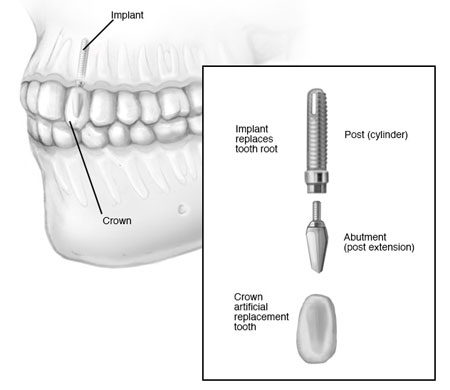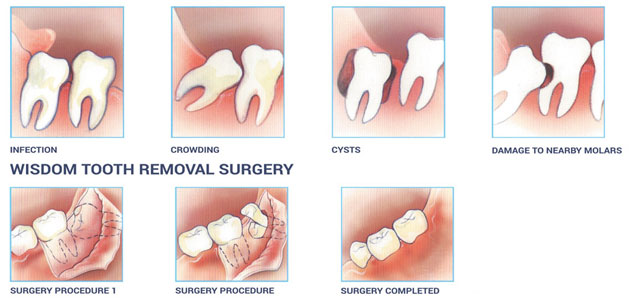Dental Implants :
Dental implants are increasingly becoming a popular alternative to dentures and bridges. Compare the options and see why:
Types Of implants?

![]() Tooth-supported fixed bridge
Tooth-supported fixed bridge
![]() Removable partial dentures
Removable partial dentures
![]() Resin-bonded bridge
Resin-bonded bridge
![]() Removable complete denture.
Removable complete denture.
Benefits Of implants :
Dental implants enable you to recapture your lifestyle after tooth loss and achieve overall well being.
After undergoing treatment, the majority of patients experience a significant enhancement in their chewing, dental hygiene and speaking ability.
Some of the exceptional benefits Dental Implants provide include :
1. Improved confidence and self-esteem
2. Increased stability within the mouth
3. Improved comfort and speech
4. Increased preservation of bone
5. Decreased gum tissue shrinkage
Dental implants can be made more affordable and what the components are which make up the cost of dental implants.
What makes up the cost of dental implants?
If you had to replace a missing tooth a dental implant is often considered the most viable solution, but what makes up the cost of the entire dental implant?
The cost of dental implant is made up of the following:
Root canal treatment is a dental procedure that replaces damaged or infected pulp in the tooth’s root canal, with a filling material.It is carried out in the following manner:
![]() The planning stages.
The planning stages.
![]() The dental implant surgery to place the implant itself.
The dental implant surgery to place the implant itself.
![]() The restoration of the crown (the part of the tooth which you see) on top of the dental implant.
The restoration of the crown (the part of the tooth which you see) on top of the dental implant.
![]() The dental implant components themselves.
The dental implant components themselves.
![]() The time of the dentist, implant surgeon and dental technician.
The time of the dentist, implant surgeon and dental technician.
Once this decision has been made the dentist will begin the planning stages. This could include CT scans, x-rays and impressions of your jaw which can then be replicated in plaster.
 Dental implant surgery is a procedure that replaces tooth roots with metal, screwlike posts and replaces damaged or missing teeth with artificial teeth that look and function much like real ones. Dental implant surgery can offer a welcome alternative to dentures or bridgework that doesn't fit well and can offer an option when a lack of natural teeth roots don't allow building denture or bridgework tooth replacements.
Dental implant surgery is a procedure that replaces tooth roots with metal, screwlike posts and replaces damaged or missing teeth with artificial teeth that look and function much like real ones. Dental implant surgery can offer a welcome alternative to dentures or bridgework that doesn't fit well and can offer an option when a lack of natural teeth roots don't allow building denture or bridgework tooth replacements.
Risks :
Like any surgery, dental implant surgery poses some health risks. Problems are rare, though, and when they do occur they're usually minor and easily treated. Risks include:
1. Infection at the implant site
2. Injury or damage to surrounding structures, such as other teeth or blood vessels
3. Nerve damage, which can cause pain, numbness or tingling in your natural teeth, gums, lips or chin.
4. Sinus problems, when dental implants placed in the upper jaw protrude into one of your sinus cavities
 Wisdom teeth usually cause no problems, but if there isn't enough space for them to grow they can cause pain, swelling, infection or damage to other teeth. Surgical removal (extraction) of one or more wisdom teeth can help to resolve these problems.
Wisdom teeth usually cause no problems, but if there isn't enough space for them to grow they can cause pain, swelling, infection or damage to other teeth. Surgical removal (extraction) of one or more wisdom teeth can help to resolve these problems.
Problems associated with Wisdom Teeth:
Wisdom teeth that are healthy and in the right position usually don’t cause problems. You may have a problem if any of the following occur:
1. Your wisdom teeth break through your gums only partway because of a lack of space. This can cause a flap of gum tissue to grow over them. The flap can trap food and lead to a gum infection.
2. They come in crooked or facing in the wrong direction causing cheek bite and ulcers at times.
Do I need Removal of Wisdom Teeth?
1. Pain or jaw stiffness near an impacted tooth.
2. Pain or irritation from a tooth coming in at an awkward angle and rubbing against your cheek, tongue, or top or bottom of your mouth.
3. An infected swelling in the flap of gum tissue that has formed on top of an impacted tooth that has broken partway through the gum.
4. Crowding of other teeth.
After Surgery
Dos:
- Use an ice pack on your face to curb swelling or skin color changes.
- Gently open and close your mouth to exercise your jaw.
- Eat soft foods
- Drink plenty of fluids.
- Brush your teeth starting the second day. Don’t brush against any blood clots.
- Take the drugs your doctor prescribes to ease pain or swelling.
Don’ts:
- Don’t drink through a straw. Sucking may loosen blood clots that help your mouth heal.
- Don’t rinse your mouth too harshly. Your doctor may suggest rinsing gently with saltwater.
- Don’t eat hard, crunchy, or sticky foods that may scratch your wounds.
- Don’t smoke. Smoking can slow your healing.
Dental implants may be the solution for you.
It is a perfect treatment or anyone who has experienced tooth loss. The only specific requirement for Dental Implant treatment is that the patient has enough bone in the area of the missing tooth / teeth to anchor the Implant. However, if this is not the case bone grafts may be placed.
Dental Implants are perfect for those patients who have had to endure the loose, unstable and uncomfortable nature of Dentures. Permanently inserted into the jawbone; Dental Implants offer exceptional strength and stability within the mouth.
